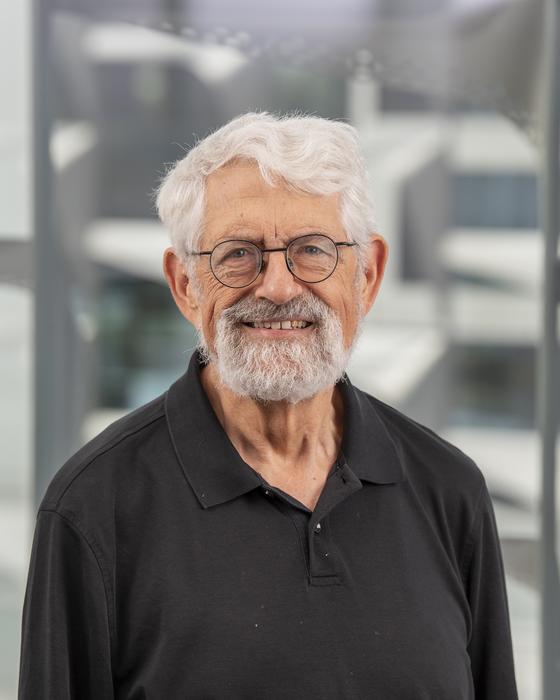Haim Sompolinsky, Professor in Residence in Harvard’s Department of Molecular and Cellular Biology and Department of Physics, has received the Brain Prize for his pioneering contributions to computational and theoretical neuroscience.

Credit: Anthony Tulliani for the Kempner Institute at Harvard
Haim Sompolinsky, Professor in Residence in Harvard’s Department of Molecular and Cellular Biology and Department of Physics, has received the Brain Prize for his pioneering contributions to computational and theoretical neuroscience.
Considered the world’s most prestigious prize for neuroscience research, the Brain Prize 2024 is shared by Sompolinsky, Larry Abbott of Columbia University, and Terrence Sejnowski of the Salk Institute. All three scientists have helped uncover key principles governing the brain’s structure, function, and the emergence of cognition and behavior, according to the Lundbeck Foundation in Denmark, which awards the annual recognition.
Richard Morris, chair of the Brain Prize Selection Committee, explained the reasoning behind this year’s awardees.
“It is inconceivable to imagine modern brain sciences without the concomitant development of computational and theoretical neuroscience,” Morris said. “The three scientists have applied novel and sophisticated approaches from physics, mathematics, and statistics to study the brain. They have developed vital tools for the analysis of highly complex datasets acquired by modern-day experimental neuroscientists.”
Director of the Swartz Program in Theoretical Neuroscience at Harvard’s Center for Brain Science and Associate Faculty in the Kempner Institute for the Study of Natural and Artificial Intelligence, Sompolinsky has spent his career developing new theoretical approaches to computational neuroscience. His research has helped establish a deeper understanding of neural processes through rigorous conceptual frameworks found in physics.
Among his most important foundational work is the establishment and theoretical understanding of models of neuronal circuit function, including circuits for long-term memory and recall, as well as elucidating the brain’s delicate balance between opposing forces orchestrated by excitatory and inhibitory neurons.
“The brain is an intrinsically dynamic organ – that’s what’s fascinating about it,” Sompolinsky said. “Think about sleep, dreaming, wandering thoughts, creative actions in arts or sciences, problem-solving. The theory gives us a framework for conceptualizing, quantifying, and studying the link between circuit dynamics and these types of functionalities in the brain.”
Over the last 10 years, Sompolinsky has been captivated by advances in artificial intelligence technologies. His current research focuses on deep learning, language models, and reasoning models in artificial neural network settings. His goal is to adapt these models to be biologically plausible, using them to test new theories about how the brain works.
“For the first time in the history of the science of intelligence, we have artificial neural networks with strong similarities to the architecture and operation of the brain,” Sompolinsky said. “We have distributed, experience-dependent processing with amazing cognitive functions that are similar in many ways to human cognition. For me, this is a game changer, and this is where I am working – at the interface between AI and neuroscience.”
Venkatesh Murthy, the Paul J. Finnegan Family Director of the Center for Brain Science, said, “There are few who lay the foundation for a growing field, but that’s what Sompolinsky has done for theoretical neuroscience. He brought approaches from physics to understand various ways a network of neurons can interact, which has led to an understanding of how brains can store and retrieve memories, how a brain knows which direction its head is pointing, and how a proper balance between excitatory and inhibitory neurons can be maintained in our brains. Now, he is bringing his customary rigorous physics approaches (and his unbounded energy) to bear on the many exciting puzzles in high-level animal cognition, as well as to the startlingly sophisticated AI models such as ChatGPT. His presence at Harvard has been transformative to many communities here.”
Before joining the faculty of Harvard in 2022, Sompolinsky spent most of his academic career as a professor at Hebrew University in Jerusalem, where he is now emeritus. His Ph.D. is from Bar-Ilan University in Israel, and his first appointment at Harvard was as a physics postdoctoral researcher in 1982, working with Professor Bert Halperin.
Sompolinsky was the 2022 recipient of the Gruber Neuroscience Prize and was elected a fellow of the Israel Physical Society that same year. He is a Foreign Honorary Member of the American Academy of Arts and Sciences and a former recipient of the EMET Prize in Life Sciences-Brain Research.
The Brain Prize 2024 comes with an award of €1.3 million to be shared by the three recipients.




